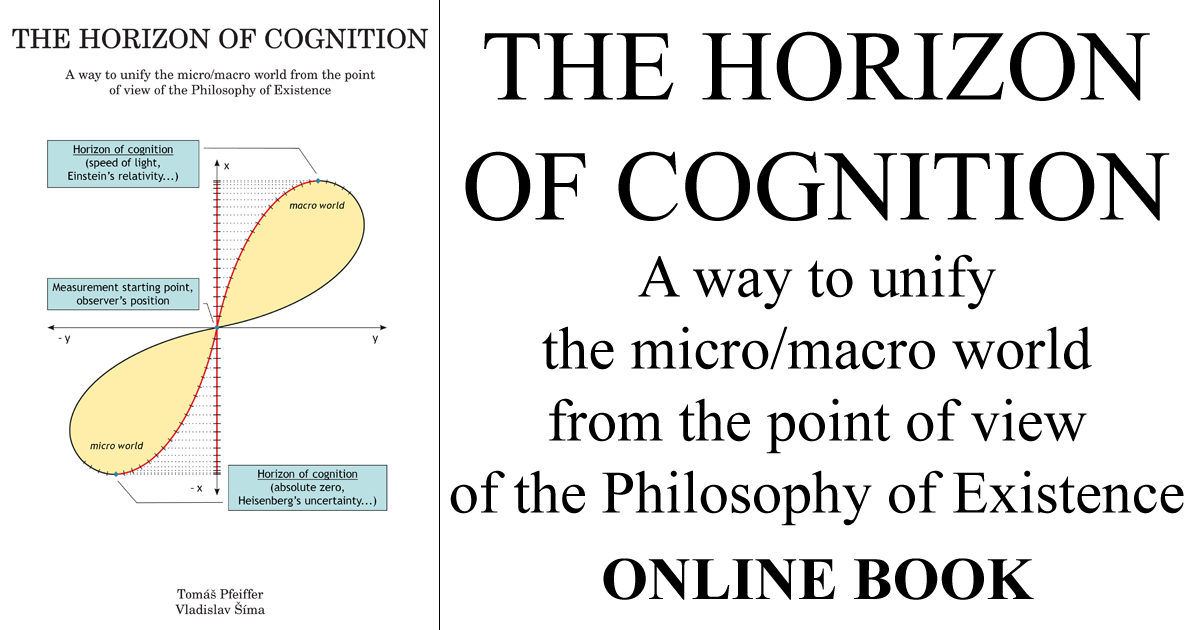Chapter 2
The Philosophy of Existence
2.3 Quantisation of spacetime
2.3.3 Space
What is space? It is again difficult to provide a precise definition. The term space is usually used to refer to an extent in which we can perceive and distinguish individual objects, their shape and motion.
Again, it is a property that determines our ability to perceive and is connected only to the observer. In actual fact, similar to time, space originates in our mind as we observe and regard the basic thought structures that create our world. As with time, the perception of space is always connected to motion.
Imagine that you want to look at two points that cannot be observed at the same time. We perceive them as spatially detached. We look at one point and then at the other, and then at the first again etc. Yet both points exist invariably, independently of us observing them (!). In fact, it is our OBSERVATION that oscillates from one to the other (like when we look left and right at a zebra crossing). Our perception of space thus originates through our observation and is hence virtual-illusory.
In our perception, space OSCILLATES, just like time.
So just like we need vibrations (periodical movements) in order to quantify time, we need scales (matter) to quantify space. When observing objects (intervals) close to the observer, space seems to be a perfectly continuous and uniform continuum. Yet here too, the case is completely different at the horizon of cognition.
Moving into the micro world, we perceive that space concentrates and thickens (as if space disappeared) to such an extent that, at the horizon of cognition (e.g. sub-particles of atom nuclei), we completely lose our ability to compare it to any scale (we do not have one). At the horizon of cognition, space completely disappears from our observations (similar to black holes at the event horizon [21]) and we can no longer measure or quantify it.
Moving into the macro world (into the super-universe), we perceive that space (our perception of the universe) spreads and thins out (as if space were increasing). At the horizon of cognition, we are not able to observe any matter (in our perception, space has spread and increased so much, that our observations do not show any matter), whatever telescope we may use, and again we are not able to compare it to anything, to measure it.
At the horizon of cognition, the oscillating nature of space also manifests itself as its quantisation. As we move into the micro world, space crumbles into a static set of states that are perceived simultaneously (a concentration and thickening of spatial perceptions into singular points, quanta). As we move into the macro world we perceive the entire visible universe as a single spatial quantum, and we are not able to distinguish any further increments (also quantised) or to compare them to anything in space.
We defined time as an oscillation between the two poles of our divided world; space can be regarded as the playground, the arena that arises between these two poles. Space is the span between zero and infinity – in our perception the span between the opposing poles of the horizon of our cognition.
Kmitavý charakter prostoru se na horizontu poznání taktéž projeví jako jeho kvantování. Prostor se směrem do mikrosvěta rozpadá na množinu možných stavů vnímaných současně (tedy koncentrace a zahuštění prostorového vjemu do singulárních bodů, kvant), směrem do makrosvěta vnímáme celý viditelný vesmír jako jedno jediné prostorové kvantum, jehož další přírůstky (které jsou také kvantovány) již nejsme schopni rozlišovat ani prostorově s čímkoliv porovnávat.
We can also regard space as a way to project an infinitely small point. In its essence, this infinitely small infinity contains everything: its compound part that is not manifested as well as the counterpart in its division, where NOTHING becomes SOMETHING, yet is in essence the same.
Read more >>

